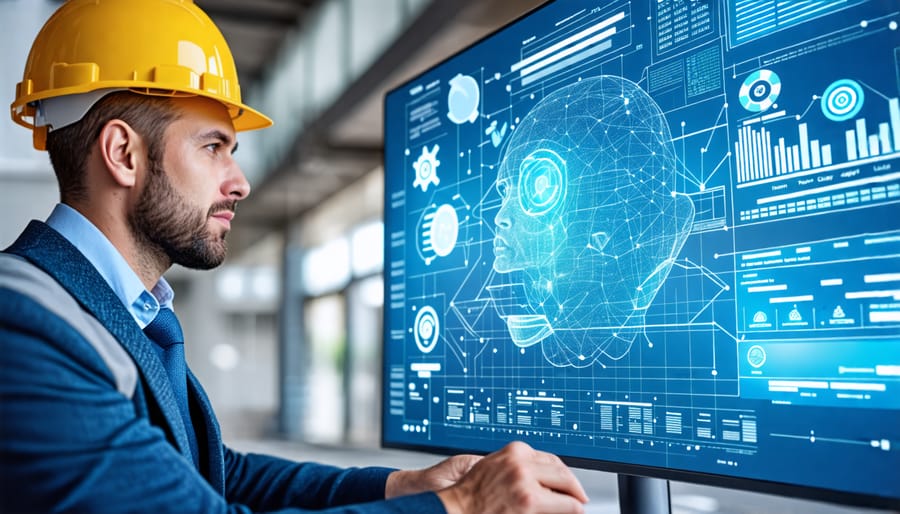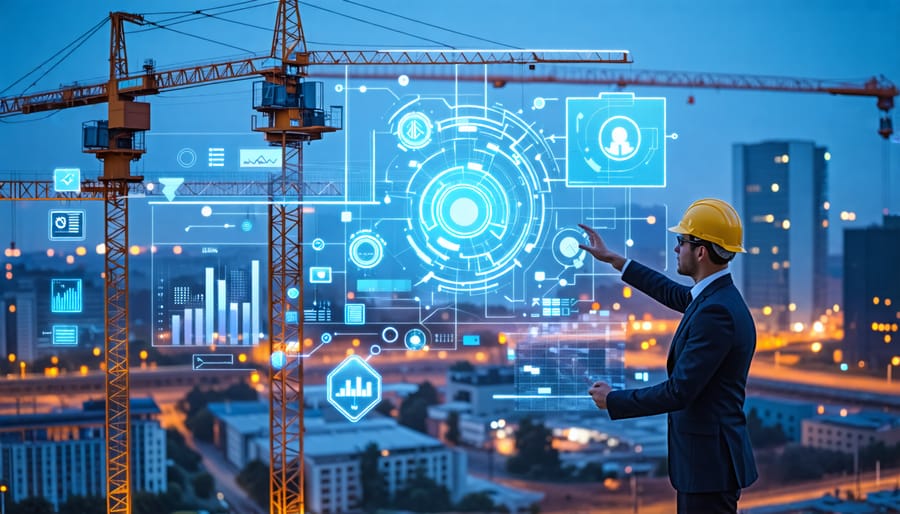Harness the power of AI to revolutionize your construction project management approach. AI-driven tools can analyze vast amounts of data to predict potential issues, optimize resource allocation, and streamline decision-making processes. By leveraging machine learning algorithms, project managers can identify patterns and trends that might otherwise go unnoticed, enabling proactive problem-solving and risk mitigation. Additionally, AI can automate repetitive tasks, such as scheduling and progress tracking, freeing up valuable time for strategic planning and stakeholder engagement. As the construction industry embraces construction innovations, integrating AI into your project management toolkit becomes essential for staying competitive and delivering successful outcomes.
Key Benefits of AI in Construction Project Management
Improved Planning and Scheduling
AI-powered planning and scheduling tools revolutionize project management in the construction industry. By leveraging machine learning algorithms and vast datasets, these intelligent systems optimize project timelines, resource allocation, and task prioritization. AI analyzes historical project data, identifies patterns, and predicts potential bottlenecks, enabling project managers to make data-driven decisions and proactively mitigate risks. Through advanced optimization techniques, AI suggests the most efficient resource allocation strategies, considering factors such as skill sets, availability, and cost. This ensures that the right resources are assigned to the right tasks at the optimal time, minimizing delays and maximizing productivity. Moreover, AI continuously monitors project progress, automatically adjusting schedules and resources in real-time to accommodate changes or unforeseen challenges. By automating complex scheduling processes and providing actionable insights, AI empowers construction project managers to streamline operations, reduce waste, and deliver projects on time and within budget. As a result, AI-driven planning and scheduling becomes a critical tool for enhancing project efficiency, improving communication among stakeholders, and ultimately driving successful project outcomes in the construction industry.


Enhanced Risk Management
AI-powered risk management tools can revolutionize the way construction projects are planned and executed. By leveraging machine learning algorithms, these tools can analyze vast amounts of historical data, identifying patterns and potential risks that may have been overlooked by traditional methods. This proactive approach allows project managers to develop comprehensive risk mitigation strategies, minimizing the likelihood of costly delays or safety incidents.
One key advantage of AI in risk management is its ability to continuously monitor project progress in real-time. By integrating with various data sources, such as weather forecasts, supply chain information, and on-site sensors, AI systems can quickly detect and alert project managers to emerging risks. This early warning system enables swift decision-making and corrective actions, ultimately reducing the impact of potential issues on the project’s timeline and budget.
Moreover, AI can assist in quantifying and prioritizing risks based on their likelihood and potential impact. By assigning risk scores and providing data-driven insights, these tools help project managers allocate resources effectively and focus on the most critical areas of concern. This targeted approach not only enhances overall project efficiency but also contributes to a safer working environment for all stakeholders involved.
Real-Time Progress Monitoring
AI-powered real-time progress monitoring is revolutionizing construction project management by enabling continuous tracking and analysis of key performance indicators (KPIs) and milestones. By leveraging advanced algorithms and machine learning, AI systems can process vast amounts of construction data from various sources, such as sensors, drones, and project management software, to provide up-to-the-minute insights into project performance. This real-time visibility allows project managers to quickly identify potential issues, bottlenecks, and deviations from the plan, enabling them to make informed decisions and course corrections before problems escalate. AI can also predict future performance based on historical data and current trends, helping project managers anticipate challenges and proactively mitigate risks. By automating the monitoring process, AI frees up valuable time for project managers to focus on strategic planning and problem-solving, ultimately leading to improved project efficiency, quality, and profitability. Real-time progress monitoring with AI is a game-changer for the construction industry, empowering project managers with the tools and insights they need to deliver successful projects on time and within budget.

Implementing AI in Your Construction Project Management Workflow
Choosing the Right AI Solutions
When choosing the right AI solutions for project management in construction, consider the specific needs and challenges of your projects. Look for software that integrates seamlessly with your existing systems and workflows, enabling a smooth transition and minimal disruption. Scalability is another key factor, as your AI tools should be able to grow and adapt alongside your business. Ensure the solution you select offers robust data security and privacy measures to protect sensitive project information.
Usability is also crucial – choose AI project management tools with intuitive interfaces that your team can quickly learn and adopt. Consider the level of technical support and training provided by the vendor to ensure a successful implementation. Additionally, assess the AI system’s ability to provide actionable insights and recommendations based on real-time data analysis, which can help optimize decision-making and resource allocation.
Case studies and testimonials from other construction firms can offer valuable insights into the real-world performance and benefits of different AI solutions. Researching the vendor’s industry expertise and track record can also help you make an informed decision. By carefully evaluating these factors and aligning them with your project management goals, you can select the AI in construction solutions that will drive the most significant improvements in efficiency, productivity, and overall project success.
Training Your Team on AI Tools
To effectively train your project team on AI tools, start by identifying the specific AI applications that align with your project goals and workflows. Conduct a thorough assessment of your team’s current skills and knowledge gaps related to these tools. Based on this analysis, develop a tailored training program that addresses the unique needs of your team members, considering their roles, technical expertise, and learning styles.
Encourage a positive mindset towards AI adoption by highlighting the benefits, such as increased efficiency, improved decision-making, and enhanced collaboration. Provide clear examples of how AI can streamline tasks and support better project outcomes. Emphasize that AI is not a replacement for human expertise but rather a complementary tool that can augment their capabilities.
Implement a blended learning approach that combines instructor-led sessions, hands-on workshops, and self-paced e-learning modules. This multi-faceted approach ensures that team members can learn at their own pace while also having opportunities for interactive discussions and practical applications. Leverage automated project management tools to create realistic simulations and case studies that allow team members to practice using AI in a safe, controlled environment.
Foster a culture of continuous learning and encourage team members to share their experiences, successes, and challenges with AI implementation. Regularly collect feedback and monitor progress to identify areas for improvement and provide ongoing support as needed. By investing in comprehensive AI training, you can empower your project team to harness the full potential of these powerful tools and drive successful project outcomes.
Measuring the ROI of AI Adoption
Quantifying the return on investment (ROI) of AI adoption in project management is crucial for justifying the technology’s implementation. To measure AI’s impact, start by establishing clear key performance indicators (KPIs) aligned with your project goals, such as cost savings, time efficiency, or quality improvements. Monitor these KPIs before and after AI implementation to gauge its effectiveness.
Conduct a cost-benefit analysis that factors in the expenses associated with AI adoption, including software, hardware, training, and maintenance costs. Compare these costs against the tangible benefits AI delivers, such as reduced labor hours, minimized rework, and optimized resource allocation. Case studies from construction firms that have successfully implemented AI can provide valuable insights into potential ROI.
Consider the less tangible benefits of AI as well, such as improved decision-making, enhanced risk management, and increased client satisfaction. While harder to quantify, these factors contribute to the overall value AI brings to project management.
Regularly review and adjust your AI implementation strategy based on the measured ROI. Continuously monitor the technology’s performance, gather feedback from team members, and make data-driven decisions to optimize AI’s impact on your projects. By taking a methodical approach to measuring AI’s ROI, construction professionals can build a strong case for its adoption and ensure its long-term success in project management.
Case Studies
Here are a couple real-world case studies showcasing how construction firms have successfully leveraged AI for project management:
Global architecture and engineering firm HDR implemented an AI-powered risk management platform on a complex $1.2 billion transit project. The system analyzed large datasets including design documents, schedules, budgets and site conditions to identify potential risks early. This enabled proactive mitigation, resulting in the project being delivered 5 months ahead of schedule and $80 million under budget.
Multinational construction company Skanska piloted machine learning algorithms to optimize scheduling and resource allocation on a major highway project. The AI system learned from past project data to predict the most efficient task sequencing and crew assignments. Managers estimate this intelligent planning boosted productivity by 20% and shaved 2 months off the project timeline compared to traditional methods.
Top 50 contractor Suffolk Construction partnered with an AI startup to develop a computer vision solution for automating site progress monitoring. Drones captured aerial imagery which the AI analyzed to generate 3D site models, identify discrepancies with BIM designs, and quantify work in place for billing. Catching issues proactively and eliminating manual surveying saved an estimated $30,000 per week.
These examples demonstrate the tangible impact strategic AI adoption can have on budget, timeline, quality and risk management-key priorities for any project team. With the right implementation, artificial intelligence is proving a powerful tool for optimizing vital project management functions.
Conclusion
The future of AI in construction project management is promising, with the potential to revolutionize the industry and drive significant improvements in efficiency, cost savings, and project outcomes. As AI technologies continue to advance, we can expect to see more widespread adoption across the construction sector, from small-scale projects to large, complex developments. However, successful implementation will require a strategic approach, including careful planning, training, and collaboration between project teams and AI specialists.
For construction professionals looking to leverage AI in their project management processes, the key takeaways are clear. First, it’s essential to identify the specific areas where AI can deliver the most value, such as scheduling, resource allocation, risk assessment, and quality control. Second, investing in the right tools and platforms is crucial, as is ensuring that project teams have the necessary skills and knowledge to work effectively with AI systems. Finally, fostering a culture of innovation and continuous improvement will be vital to staying ahead of the curve and maximizing the benefits of AI over the long term.
By embracing AI as a powerful tool for enhancing project management, construction professionals can position themselves and their organizations for success in an increasingly competitive and dynamic industry landscape. The future belongs to those who are willing to adapt, innovate, and harness the full potential of artificial intelligence to drive better outcomes and create lasting value for all stakeholders.

